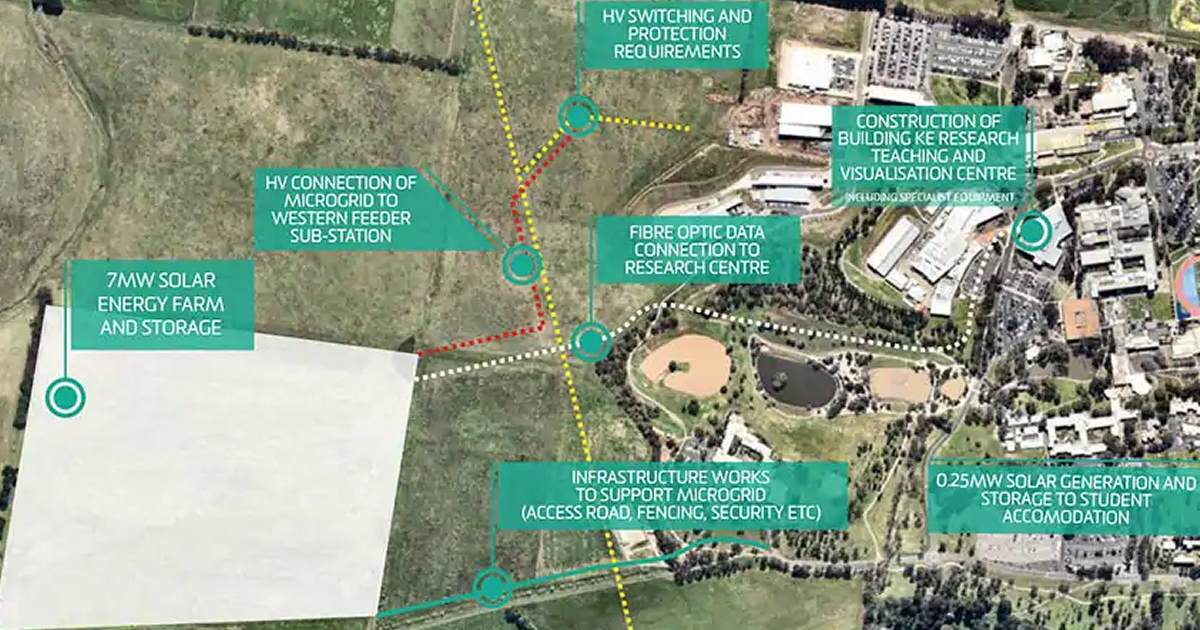
The $23 million Deakin Renewable Energy Microgrid at Deakin University’s Geelong Waurn Ponds campus was officially opened yesterday.
Among those attending the event was Dr Alan Finkel AO, previously Australia’s Chief Scientist and currently Special Adviser to the Federal Government on Low Emissions Technology; who along with Deakin Vice-Chancellor Professor Iain Martin “turned the key” on the project.
The stars of the microgrid are a 7-megawatt solar farm (23,000 solar panels) – claimed to be the largest solar farm built on an Australian university campus – and a 2 megawatt-hour central battery storage system situated on 14.5 hectares of farmland at the rear of the Waurn Ponds Campus.
The central battery is based on lithium iron phosphate (LiFePO₄) chemistry, chosen for the project as it is “very stable, safer, has a longer lifetime and avoids the use of cobalt, a material that can have ethical and social impacts in its production.”
Additionally, 250kW of distributed rooftop solar power system capacity (833 panels) has been installed across campus rooftops along with associated battery systems with a collective capacity of 30 kilowatt-hours.
Another element of the microgrid project is a Research, Teaching and Visualisation Centre that has been established in the Centre for Advanced Design Engineering Training (CADET) building. This will also provide opportunities to schools, other universities and community interest groups to learn more about renewable energy.
Deakin’s campus at Waurn Ponds was chosen from the microgrid project as it’s the centre of the University’s energy research and provides opportunities to simulate broader community and city environments.
“The research focus incorporated into the design of the infrastructure builds on consultation with universities around the world, including Princeton and the University of California at San Diego,” said Dr Adrian Panow, Director of Deakin Energy.
A Big Step Towards 100% Renewables
The microgrid is expected to meet more than half of campus electricity consumption and avoid 12,000 tonnes of greenhouse gas emissions each year, playing a very important role in Deakin University’s commitment to be carbon neutral and using 100% renewable electricity by 2025 (previously 2030). By 2030, Deakin is aiming to achieve carbon negative by abating more carbon than the institution generates.
The University is currently also purchasing renewables-generated electricity through the Melbourne Renewable Energy Project 2 buying group. Most of the electricity under that arrangement is being sourced from the 28.7MW Yaloak South Wind Farm, which is situated approximately 15 kilometres south of Ballan; around one hour west of Melbourne.
“We want to be a working example – a ‘living lab’ – of how a large organisation can lead through its actions and fundamentally change its ways of doing,” said Vice-Chancellor Professor Martin. “This includes the complete, systemic integration of sustainability across all our activities.”
In his address at the opening, Professor Martin also stressed achieving a sustainable energy future in Australia will require a bi-partisan political commitment over the next few decades.
“The political and community leadership required will be significant.”
The Deakin microgrid project was carried out through a partnership with AusNet Services via its independent subsidiary, Mondo Power.

 RSS - Posts
RSS - Posts



Speak Your Mind